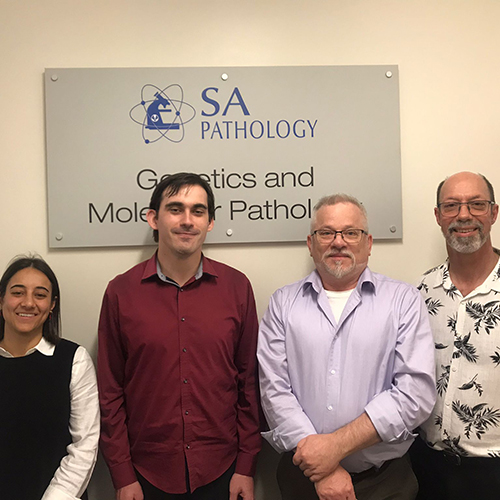
An Adelaide family has played a crucial role in the discovery of a new bone marrow disease called ERG Deficiency Syndrome, leading to the introduction of a new clinical diagnostic test.
Centre for Cancer Biology (CCB) researchers at SA Pathology and the University of South Australia made the breakthrough after investigating the family's battle with a complex set of blood disorders.
The mother who suffered from several blood disorders in early adulthood, was subsequently diagnosed with acute myeloid leukaemia. A pattern of similar blood disorders was also recognised in her children, prompting genetic researchers to investigate.
Extensive genetic testing by genome sequencing was performed on each affected family member ruling out all known genes associated with bone marrow failure and blood cancer.
The family was then recruited into the Australian Familial Haematological Conditions Study (AFHCS) based in Adelaide, and their genome was re-examined by the researchers to detail their genetic information.
It was here that researchers made a surprising discovery, identifying a highly suspicious mutation in the ERG gene, not previously known to cause symptoms linked to familial bone marrow failures and blood cancers.
Adding to the complexity, the mutation was discovered by looking at hair samples as it was hidden by a mechanism called somatic gene rescue, masking the variant in each of the family members' blood samples.
After calling national and international colleagues and entering the mutation into an international matchmaking database (used for rare diseases to bring together researchers, who have identified patients with similar clinical symptoms and mutations in the same gene), the genetic researchers identified a cohort of patients from around the world with ERG mutations linked to bone marrow failure and blood cancer.
The team then designed state-of-the-art bespoke tests to demonstrate that the mutations severely disrupt the role of ERG in the normal development of blood cells in a way that may predispose them to bone marrow failure and blood cancer.
As a result, ERG has now been added to routine testing as a clinical screening test for bone marrow failure and blood cancer at SA Pathology and is being implemented worldwide.
The discovery also opens the door for predictive testing, offering reproductive choices to families at risk, and screening of unaffected family members carrying the mutation for early detection of the disease.
For those diagnosed with the disease, bone marrow transplantation offers a potential cure so the breakthrough also means that clinicians can identify unaffected family members as potential bone marrow donors.
Quotes attributable to Lead Researcher and SA Pathology Head of Genetics and Molecular Pathology, Professor Hamish Scott
This Adelaide family has helped us pave the way for the identification of ERG Deficiency Syndrome, marking an exciting new chapter in our understanding of blood conditions.
By being able to identify this mutated gene, we can diagnose patients and predict the likelihood of bone marrow failure and blood cancer occurring in the future, which will undoubtedly help countless families across the world.
Quotes attributable to Researcher and Section Head of the Molecular Pathology Research Laboratory, Associate Professor Chris Hahn
Thanks to this one Adelaide family, we have uncovered a new pathway in understanding blood conditions, enabling doctors to better monitor and counsel individuals at risk, which will help to improve blood cancer outcomes by early detection and optimal therapy.
Hereditary cases of bone marrow failure and blood cancers are devastating for families, so identifying genetic mutations in those affected by these diseases has immediate implications for family members.
..................................................................................................................................






